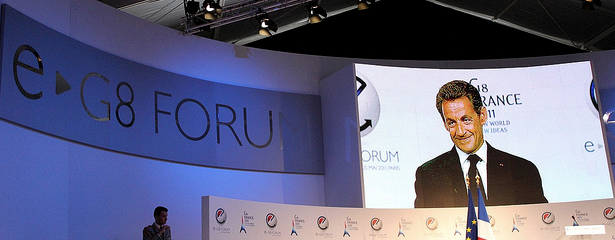Following the E-G8: The Future of the Internet?

French President Nicolas Sarkozy speaks to attendees at the e-G8 forum Photo: cattias.photos
The e-G8 forum wrapped up today in Paris. An initiative of French President Nicolas Sarkozy, the e-G8 had a wide-ranging agenda, including innovation, growing the Internet economy, privacy, and intellectual property. Its stated purpose was to give space for “key players of the Internet and the digital universe” to “propose, exchange and discuss ideas, so that you can enrich the [G8] meeting.” A delegation of tech company executives will now take outcomes of the e-G8 forum to the G8 summit, a meeting of the governments of eight of the world’s largest economies being held later this week.
Even a casual glance through the program and participant list for the e-G8, however, reveals some striking gaps. There is very little civil society or NGO representation. And none of the sessions explicitly focus on the role technology has played in democracy movements and in enabling human rights – an odd omission given the recent Arab Spring. In his opening remarks, President Sarkozy reminded the gathered group of Internet executives that “[t]he universe you represent is not a parallel universe. Nobody should forget that governments are the only legitimate representatives of the will of the people in our democracies. To forget this is to risk democratic chaos and anarchy.” Sarkozy also discussed the need for tighter regulation of the Internet through global governance and global rules.
True enough that the Internet is not a parallel universe – indeed, networked technologies are becoming inextricably woven into our social, economic, and political lives. But a genuine dialogue about the future of the Internet requires participation from all who have a stake in the medium, including citizens themselves. And any discussion of Internet regulation must include an explicit discussion of the importance of the medium to human rights. Governments in the G8 are without doubt facing difficult and legitimate policy challenges. However, policy solutions must also stay true to the human rights commitments these same governments have made. Citizens and watchdog NGOs play a critical role in holding governments accountable to their commitments.
Situating the e-G8 within the larger context, we could view President Sarkozy’s initiative as an early salvo in a more complex struggle over how the global Internet will be governed. Judging from his remarks, past and present, Sarkozy envisions a future where all governments exert far more control over the Internet, whether through national law or through inter-governmental organizations. An open question remains whether such an Internet — less global, more fragmented along geopolitical lines — would be as powerful a force for democratic change and human rights as we have witnessed this year in the Arab world.
Like many others, I followed the e-G8 discussion through the live stream and on Twitter. I am not the only one to notice these gaps or raise the above concerns: many members of civil society have striven to have their voices heard. The debate now moves to the G8 in Deauville. Let’s see what emerges later this week.